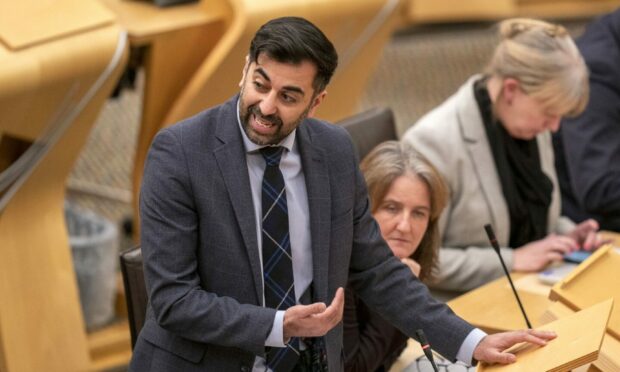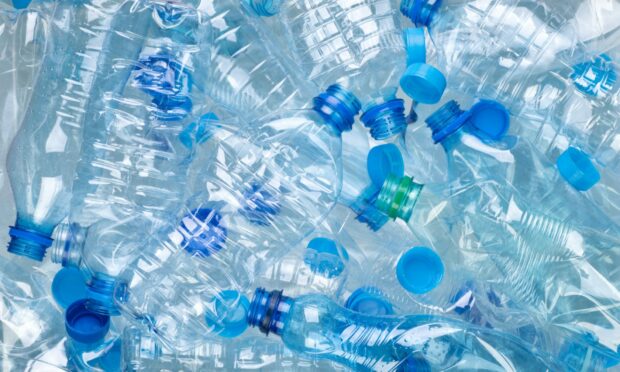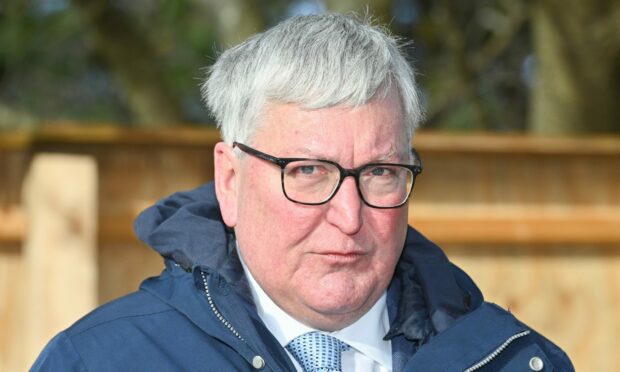First Minister Humza Yousaf put the brakes on three huge SNP policies which were central to Nicola Sturgeon’s legacy before she stood down.
In what was billed a reset for the new leader, Mr Yousaf confirmed the controversial deposit return scheme will be delayed, proposals to ban alcohol advertising are being reconsidered and the National Care Service is being halted.
All three policies were strongly championed by Ms Sturgeon when she was still in charge – but all met with strong opposition.
Mr Yousaf’s speech drew attention to underlying problems on the same day as the SNP’s treasurer was arrested in connection with a police probe of party finances.
Here’s what the new leader changed in his statement to parliament on Tuesday.
1 – Deposit return scheme
The deposit return scheme, due to begin in August, will be delayed until the start of March next year.
The controversial environmental project aims to charge customers 20p every time they buy a single-use drinks container.
Consumers would then be able to get their money back by taking their can, glass or bottle to designated recycling points across the country.
The proposals were opposed by a number of small businesses who warn the scheme leaves them in jeopardy as costs increase.
One Fife wholesaler warned the scheme would increase drinks prices by much more than anticipated.
The project also left SNP rebels incensed. Highland MSP Fergus Ewing branded the initiative a “disaster” which threatened to become a “catastrophe”.
Mr Yousaf blamed the delay on Tory trading laws introduced after Brexit, but admitted he had listened to the fears of worried business owners.
He told MSPs: “I have heard the concerns of business, particularly about the scheme’s readiness for launch this August.”
The policy has been steered through Holyrood by Scottish Greens co-leader Lorna Slater, who repeatedly insisted it would go live this summer.
2 – Alcohol advertising
In a second announcement, Mr Yousaf said plans to severely curtail alcohol firms from being allowed to promote their brands will go back to the “drawing back”.
The proposals were intended to stop children from being exposed to alcohol at a young age.
Whisky firms warned the measures would leave them unable to sell their own merchandise, a crisis in a country famed for the product.
Mr Yousaf admitted the policy had caused “real concern” to the industry, despite its goal being “admirable”.
He said: “I have instructed my officials to take these ideas back to the drawing board, and to work with the industry, and with public health stakeholders, to agree a new set of proposals.
“I believe that all of us want to reduce the harm caused by alcohol, particularly to young people but without undermining Scotland’s world class drinks industry or tourism sector.”
3 – National Care Service
Lastly, Mr Yousaf confirmed the National Care Service will be paused.
The policy proposes to centralise all social care services in Scotland into one body.
The planned service – originally scheduled for completion by 2026 – also met heavy criticism.
Mr Yousaf said he wants to see the proposals given more scrutiny before a final model is agreed upon.
He said to MSPs: “I confirmed we would ask and seek from parliament an extension to the scrutiny process.
“My hope is that by taking slightly more time to agree a way forward, we can ensure that we agree and achieve that aim.”
Here’s where SNP rebels are getting impatient
One major promise the new first minister will be expected to deliver is the SNP’s vow to dual the A9 between Perth and Inverness.
SNP MSP Mr Ewing reminded Mr Yousaf he had pledged to keep the commitment to widen the road at the top of his agenda.
But the SNP leader was unable to give his impatient backbencher an update on when more detail on the schedule for the project can be expected.
What’s the good news?
Mr Yousaf confirmed a six-month pilot scheme scrapping peak-time rail fairs is set to begin in October.
His party’s aim is to ensure travel costs are “more fairly shared” a year on from ScotRail being taken into public ownership.
The SNP leader also promised six new ferries would be built to help Scotland’s struggling ferry network.





Conversation